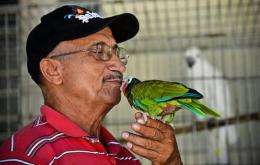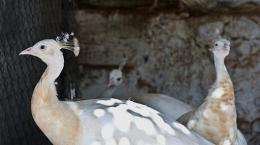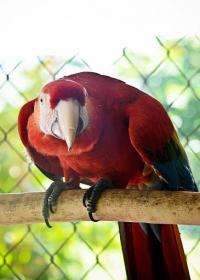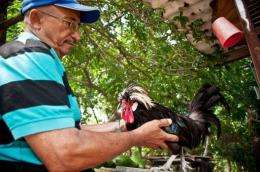Birds far from angry in Cuban vet's sanctuary

A retired Cuban veterinarian has found a new direction rescuing rare birds, breeding parrots and peacocks, winning enough feathered-world fame to swap fowl with Venezuela's Hugo Chavez.
In the 1950s, Maique Lores fought with rebels who brought the Cuban regime to power, before enjoying a long career as a vet.
These days, however, he has his mind on all corners of the avian world, from exotics to fowl to his "endangered birds rescue and care unit," with hundreds of feathered friends thriving at his home.
"We rescue endangered birds, breed them and then release them in protected areas so they do not end up on someone's plate," said Lores, 68.
At dawn, Lores and his wife Marilyn, a fellow veterinarian and bird fan, wake to the cocks crowing in the garden of their home just west of Havana, not far from where revolutionary icon Fidel Castro lives.
Some hens roam freely. One named Cuqui makes itself at home and lays eggs on the staircase of the two-story house.

Exotics dot the grounds, some in corrals and others in cages, like white peacocks from India and a yaco from Africa—Lores says they are among the world's smartest birds.
His dining room table is stacked with bags of corn feed, and two rooms are crowded with cages of orioles, a nightingale and parrots large and small.
But the favorite of the house is a chatty if occasionally shy parrot called Paquito, whom they consider a member of the family.
"Say hello, Paquito, come on," his master said affectionately, but the bird had no comment to make to a visiting reporter.
Lores has two Cuban parrots called cateys, locally famous for mating for life. Often, when one of a pair dies, the other will refuse to mate again.

Despite all these efforts and his professed love of animals, Lores nonetheless admits he still loves chicken soup.
Corrals at the facility are a frenzied dance of parrots and macaws, and fowl from quail to hens ordinary and exotic like Polish hens, with bright plumage and outsized crests, and Paduans, an old breed that is bearded without wattles.
Another enclosure holds the unusual sight—at least in these parts—of white peacocks, which originally came from India.
Due to their relative novelty in the West, Lores sent a pair to the leftist firebrand Venezuelan president Hugo Chavez.
Chavez, a key political and economic ally of communist Cuba. often travels to Havana, including recently to treat a cancerous tumor.
"I sent off a male and female to Venezuela for resident Chavez. He sent me back a pair of macaws," Lores recalled fondly.

He built a large special cage for his gift macaws from Chavez, but the female pulled its own feathers out from stress and no longer can fly. "I have had to separate the male and female because otherwise she will go eat his feathers," Lores explained.
Though he did not get into the bird business for money, his road to financial success has been paved with feathers.
To fund his facility, he sells fowl and eggs, and even sells feathers that fall off his birds.
Many of the feathers are used in Afro-Cuban Santeria religious rites, and can sell for up to $10 a piece—half of an average Cuban worker's monthly salary. But Lores insists he would never pluck one, no matter how precious or valuable, before it's natural molting time.
The birds enjoy fresh fruit—which is also frozen and thawed for times of the year when it is out of season—such as mangoes and tamarinds, mamey sapote and avocados.
"It's a lot of work, but everything that has to do with nature, I have just loved ever since I was a kid," Lores recalls with a smile.
(c) 2012 AFP
















